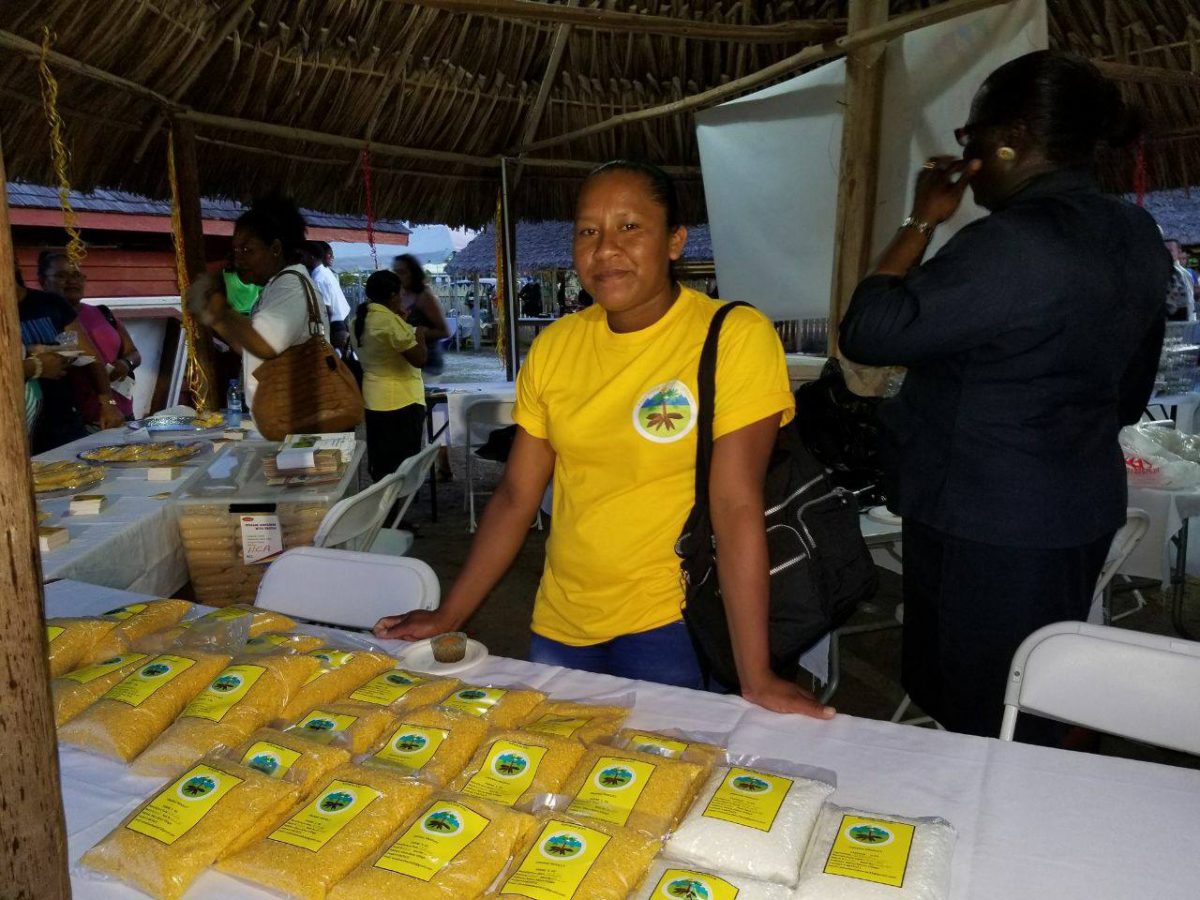At Moco Moco Village in Region Nine, Central Rupununi, opportunities for sustainable employment are few. Annalisa Edwards, a Macushi woman and a resident of Moco Moco is the manager of the Kayaweng Women’s Agro Processors Group, established in 2018, and these days comprising fifteen women.
Kayaweng is a Macushi word meaning ‘Sky Valley’ and the Association was born out of the need to create gainful employment for women in the community as well as to develop a storehouse facility in the event that a natural disaster threatened to imperil the community’s farm crops. The initiative was a response to bitter experiences of crop loss through flooding.
A small factory, outfitted with modest but efficient equipment marked the start of the initiative. It was a gift from the Canadian International Development Agency (CIDA). In 2018 Kayaweng commenced the production of farine, part of the community’s staple diet. Most of the farine used by the community was, hitherto, imported from Brazil. Earlier this year, the group began producing cassava bread.
Efforts to establish business enterprises in remote hinterland communities, however, are never without their frustrating challenges. In this instance there is the high cost of transport associated with moving cassava from farm to factory so that while the factory had the capacity to process 500 kilos of cassava per month the transportation challenge limited them to no more than 390 kilos.
The farmers, here, and in neighbouring communities use privately-owned bicycles and motorcycles. A single community-owned minibus is, understandably, over-taxed. Much of its work involves moving passengers from Moco Moco to Lethem, fourteen miles away. The trip costs twelve thousand dollars.
The coronavirus pandemic has brought the minibus service to a shuddering halt. With ‘local’ sales of its products almost entirely dependent on the Lethem market and with highly unreliable alternative transportation prohibitively expensive, the commercial operations of Kayaweng are now at a virtual standstill.
Analisa says that Kayaweng’s probe of the coastal market through participation in events like Farmers’ Markets and the UNCAPPED event have been largely unsuccessful. While small pockets of patronage may have been realised there has been no significant breakthrough. What the Group’s experience has triggered is a diversification of the range of their products beyond farine. They are now diligently probing the coastal belt for a market for their cassava bread.
The Guyana Shop has been useful as an outlet for marketing the Group’s products though the problem arises out of the high cost of moving goods from the hinterland to the capital. There is, too, the limited volumes that the Guyana Shop can handle.
On those occasions when the private farmers are unable to supply the volumes of cassava necessary to meet Kayaweng’s production requirements, the women in the group ‘fall back’ on their own three-acre plot of land to supplement their supplies.
Over the past five months, roughly the period during which Covid-19 has been menacing Guyana, markets have dried up. Over that period farine sales have slipped from around 350 kilos per month to roughly 200 kilos. The closure of the Hot Meals Programme at community schools has impacted sales immensely. In the past, the Helping Hands Cooperative Society located at St. Ignatius, would assist Kayaweng with sales at Lethem. Helping Hands has recently folded.
The constraints which the women of Kayaweng are experiencing are a microcosm of the challenges confronting numerous hinterland communities. COVID-19, they say, has simply made an already challenging situation worse. At their factory, seven of the fifteen women work for two months while the others work on their small private farms. The latter group sells their cassava to the factory then there is a ‘turn around.’ It is a way of ensuring that they secure roughly equal benefit from the enterprise. There can be no question that successive coastal administrations have been afforded more than sufficient time and opportunity to continually improve the lot of these communities. Enough has not been done. Analisa believes that it still takes far too long for things like Food Handlers’ Certificates and in addition, she said she would like to see a reduction in the time for the renewal of Food Handlers’ Certificates to be expedited. Although the process is executed at Lethem it still takes all of three months. More efficient interior transportation as well as an improved service to move goods from hinterland locations to coastal markets could see the acceleration of the creation of hinterland enterprises of various kinds. There is also need for various types of training associated with business growth.
If Edwards believes that, by their very nature, the women of Moco Moco will never be weighed and found wanting in terms of lack of effort, she believes that a consolidated effort to throw more state resources behind their efforts will see the alleviation of many of the challenges that continue to hamper the growth of hinterland communities.





